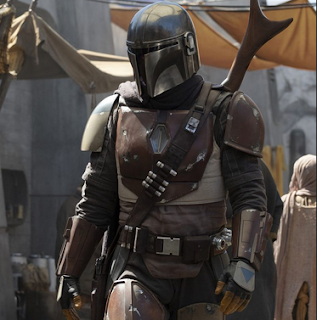 |
| HDM poster |
I knew about the books of course, I had to. But still, I came cold to this new TV show, able to assess it as a TV series without comparing it to the novels.
And I found the first episode interesting enough to come back for more.
These are YA novels, and they're all about the children really even though the adults dominate the posters for the show.
As usual for this kind of show, the adults inhabit a dark and often violent world that the children--because they're children--only gradually come to understand; the story is about the children's awakening into this adult world. This perspective yields great results in a novel (for example, Shane; Roll of Thunder, my own Temangwane) but is difficult to translate to a screen because you have to mostly eschew thoughts (voice-overs can be cumbersome and break the flow of the narrative) and reveal emotion through action. Also, finer details of relationships can be difficult to portray in the different medium. As far as this show is concerned, the notion of characters having their own attendant daemons (animals who shape-shift, counsel and talk) is poorly explained and could have been integrated better.
The main character is Lyra, a young girl who is obviously special but we don't know why. Learning who her father is was a surprise, but her mother not so: I twigged that early on. Lyra and her friends get kidnapped by adults but they don't know why. The gossip doing the rounds is that the children are being taken by the Gobblers (a wonderful name as it sounds on the one hand like monsters from a nursery rhyme or fairy-tale, and on the other has similarities to the old English word for demon, goblin).
Well the children are being kidnapped and it seems as if Lyra can save them but that's only because the shape of the story suggests that outcome: in the first 3 episodes we learn she has some power but she doesn't know how to use it (this reminded me of Stephen R Donaldson's The Chronicles of Thomas Covenant). We also don't know what her power is either, only that she has something. The families whose children are being taken know they should protect and even hide Lyra from the authorities; the authorities, obviously, are going all out to capture her. All the ingredients for a good show!
 |
| Lyra and her daemon |
The title, His Dark Materials, is a quote from the poet Milton about the creation of worlds, and this trilogy includes parallel worlds that a few people are able to navigate between. This is useful story-stuff too, but again has been under-developed so far.
The trilogy has already been attempted as a (rather disappointing) film, but this TV series so far has been entertaining and absorbing. It remains to be seen though how much of the rich seam of material from the novels can be utilised in this different form--there are simply some things that only work in books and others that only do well on a screen. I suspect many fans of the books already have misgivings about the TV series. If you haven't read the books then there might be some questions that go unanswered. It's the old problem of adaptability.






